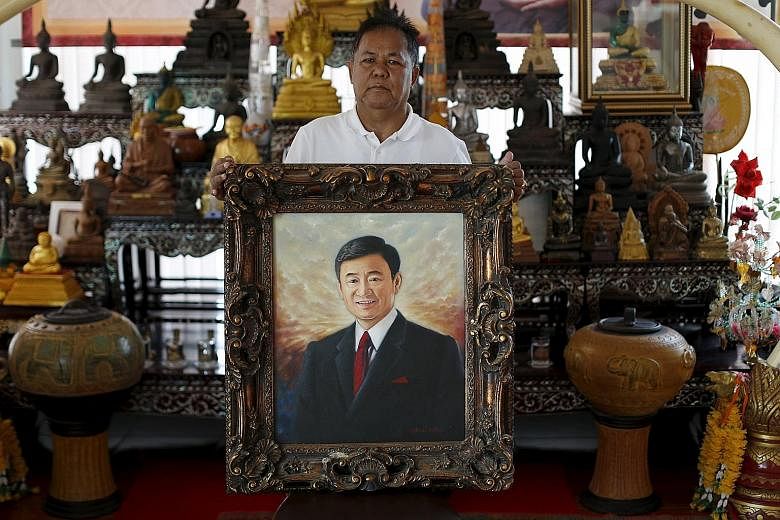UDON THANI, Thailand • From self-imposed exile, the influential leader of Thailand's rural "red shirt" opposition movement has delivered a simple message to followers chafing at the military junta's iron rule: Lay low for now, don't panic, "play dead".
Billionaire former prime minister Thaksin Shinawatra, long-time political leader of the north's disenfranchised electorate, is watching events at home closely and urging patience from those who want to see his allies return to power.
"When I spoke to Thaksin, he told me to pretend to be dead a little longer," said red-shirt leader Kwanchai Praipana, a popular pro-Thaksin leader in the northeastern province of Udon Thani.
"He told me to... wait until the next election. That will be the moment that we will win. The only question is whether an election will ever take place."
Mr Kwanchai said he spoke to Thaksin a month ago, though he did not specify how they communicated. Thaksin, who lives abroad to avoid a jail sentence for graft, was ousted in a coup in 2006 but remains a major figure in Thai politics.
While the military has kept a firm grip on power since it felled the remnants of the government of Thaksin's sister, Yingluck Shinawatra, in another coup last year, he and his allies have won every election since 2001.
And anger is mounting among farmers and political opponents.
The military government has slashed rural subsidies, and the coup's leader, Prime Minister Prayut Chan-o-cha, said this month that the next election would not be held until "around" July 2017, the latest delay to Thailand's return to democracy.
The reference to playing dead resonated with Mr Kwanchai, who rolled up his sleeve to show a scar on his upper arm from a drive-by shooting at his rural home when Bangkok was paralysed by protests that preceded the coup.
Mr Prayut's ban on political activity has severely curtailed the red-shirt movement and his junta has quashed any sign of open dissent. "They have bullied us too much," said Mr Kwanchai, adding that he has to report his movements to the military every day.
Mr Prayut staged the coup and banned political activity after months of deadly street clashes, saying he had to reconcile a dangerously divided society.
Many Thais, especially Bangkok's middle class and urban elite, backed the intervention.
But sharp divisions remain and the Shinawatras retain their popularity in northern strongholds.
A draft Constitution that critics said was an attempt by Mr Prayut to prevent a comeback by the Shinawatras was rejected by a military-appointed reform council.
Hundreds of activists last Saturday defied a ban on protests and marched in Bangkok in a rare rally against the military to mark the ninth anniversary of the coup against Thaksin.
Compared with the Shinawatra clan - whose subsidy schemes for farmers were fiercely criticised as vote-buying - Mr Prayut has done little for Thailand's farmers.
Without the subsidies, rice farmers have seen their income per kilogram of rice fall by about a third and are struggling to pay down debt they took on when times were good. But despite his distaste for populism, Mr Prayut has turned to one of the architects of Thaksin's economic policies in an attempt to revive Thailand's stumbling economy.
Farmers say the soft loans and spending on small projects announced so far are not enough. "This government tells us to stop making demands and to live sustainably," said rubber plantation owner Samai Sribang, who lives in Nong Khai province near the border with Laos. "But how can it be sustainable if we can't sell our goods? If Thaksin can hear us, tell him we are almost dying."
REUTERS

